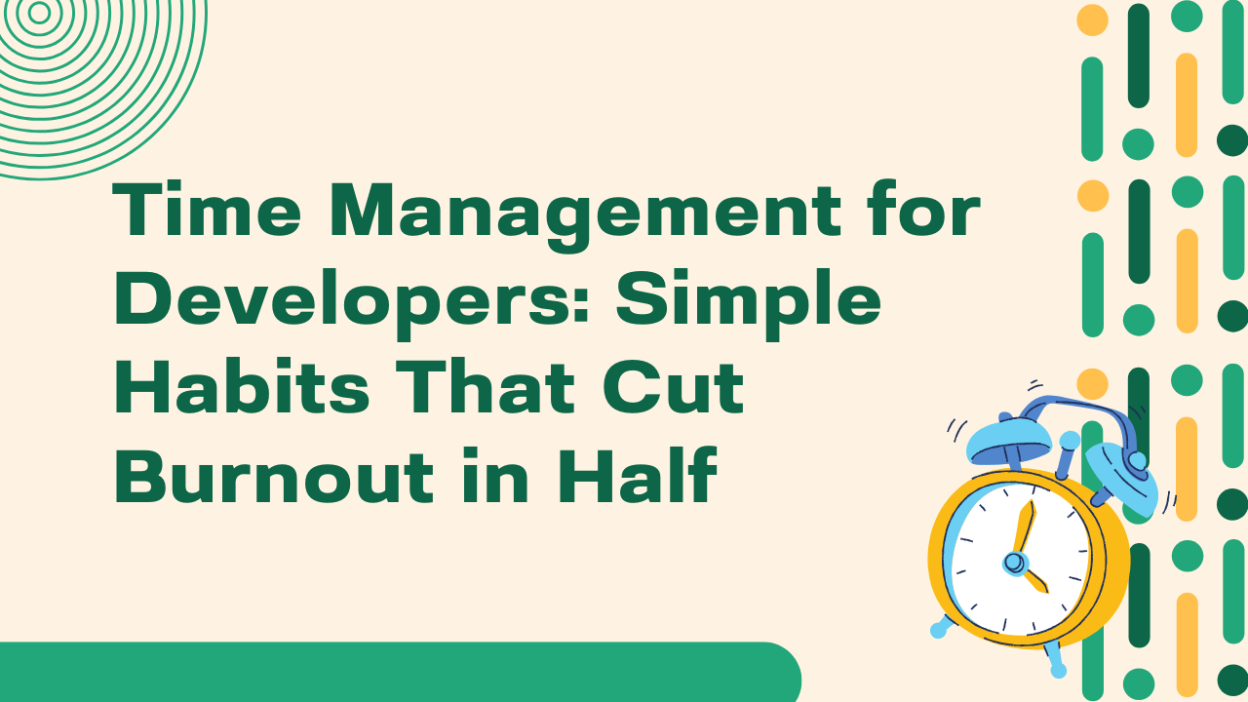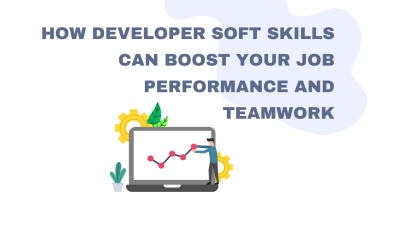As someone who has spent years working closely with development teams at Qtec Solution Limited, I can tell you that time management for developers is more than just a skill, it’s an essential practice for maintaining productivity and well-being.
Developers are often tasked with handling multiple projects, deadlines, and responsibilities. Without the right strategies in place, burnout is inevitable. But by adopting effective time management habits, it’s possible to reduce stress and perform at a consistently high level.
In this blog, I’m going to share the practices that have worked for me and my team in mastering time management for developers. These simple yet powerful strategies will help you work smarter, not harder, and set you up for long-term success.
Table of Contents
Prioritize Tasks with the “Eisenhower Matrix”
One of the most crucial skills I’ve gained in time management for developers is learning how to prioritize tasks based on their urgency and importance. This is where the Eisenhower Matrix comes into play. By organizing tasks into categories, I ensure that I’m always working on the most impactful work first. Here’s how you can apply it:
- Urgent and Important (Do Now): These tasks are the highest priority and must be completed immediately. I focus on these tasks first to keep my time management on track.
- Important but Not Urgent (Schedule): These tasks are essential but don’t have immediate deadlines. I schedule them to make sure I can address them before they become urgent.
- Urgent but Not Important (Delegate): These tasks might seem urgent but can be passed off to someone else. Delegating tasks helps me free up time for more critical aspects of my time management.
- Not Urgent and Not Important (Eliminate): These tasks are distractions. I eliminate or minimize them, ensuring that my time management remains focused on what truly matters.
By applying this matrix, I’ve been able to stay focused on high-priority tasks while minimizing the noise and distractions that can derail my day.
Break Projects Into Smaller Tasks
One of the best practices I’ve adopted for time management for developers is breaking large projects into smaller, more manageable tasks. Large projects can feel overwhelming, but when I divide them into smaller steps, I create a roadmap that makes everything feel more achievable. Here’s how I approach it:
- Create Micro-Tasks: Instead of thinking about the entire project, I break it down into smaller pieces. For example, instead of “complete the app,” I’ll set micro-tasks like “design the login page” or “implement user authentication.” This makes it easier to focus on time management for developers.
- Set Clear Deadlines: I assign realistic deadlines to each micro-task, which keeps me on track and ensures that my time is efficient.
- Celebrate Small Wins: Every time I complete a task, I take a moment to recognize my progress. This helps keep me motivated and reinforces my commitment to good time management.
By breaking large projects into smaller tasks, I’ve been able to reduce stress and maintain momentum throughout the development process.
Master the Pomodoro Technique
The Pomodoro Technique has been a game-changer in time management for developers. It encourages focused work in short bursts, which helps maintain high levels of productivity while preventing burnout. Here’s how I use it:
- Work for 25 Minutes: I focus solely on one task for 25 minutes, giving it my full attention. This method allows me to stay productive without feeling overwhelmed, making my time more effective.
- Take a 5-Minute Break: After each 25-minute session, I take a quick break to recharge. These short breaks help avoid mental fatigue and keep time management for developers on track.
- Repeat: I repeat this cycle four times, and after every four Pomodoros, I take a longer break of 15–30 minutes. These breaks give me time to refresh and refocus, ensuring my time is sustainable.
This technique has helped me stay focused throughout the day, maintain high energy levels, and avoid burnout.
Set Boundaries and Manage Expectations
One of the hardest lessons I’ve learned in time management for developers is the importance of setting boundaries. In a fast-paced development environment, it’s easy to say yes to everything, but this can quickly lead to burnout. Here’s how I approach it:
- Set Realistic Expectations: If a project or feature request isn’t feasible within the given timeframe, I’m upfront about it and suggest a more realistic timeline. Setting clear expectations allows time management for developers more effectively.
- Limit Multitasking: I’ve learned that multitasking only makes me less efficient. Instead, I focus on one task at a time, ensuring that I can fully devote my attention to each aspect of the project. This has improved my time management considerably.
- Learn to Say No: Saying no is crucial when it comes to protecting your time. If a task doesn’t align with my priorities or I’m already at capacity, I don’t hesitate to turn it down, which helps keep my time management on track.
By setting clear boundaries, I’ve been able to manage my workload better and reduce unnecessary stress.
Track and Reflect on Time Spent
Tracking time is a game-changer in time management for developers. When I didn’t track my work, I often felt like I was losing time, but once I started measuring how I spent my hours, I could make more informed decisions. Here’s how I approach it:
- Use Time Tracking Tools: I use tools like Toggl or RescueTime to track how much time I’m spending on each task. These tools give me insight into how my time is structured, helping me pinpoint areas where I can improve.
- Review Your Day: At the end of each day, I review how my time was spent. Was I productive? Did I get distracted? Reflecting on the day helps improve time management for developers.
- Adjust Your Approach: If I notice certain tasks or activities are taking too long, I adjust my approach. Small tweaks can make a big difference in improving time management for developers.
This process has allowed me to fine-tune my daily routine and become more efficient with my time.
Learn to Delegate and Collaborate
When I first started in development, I tried to handle everything myself. Over time, I realized that collaboration and delegation are crucial for effective time management for developers. Here’s how I’ve embraced this approach:
- Delegate Non-Essential Tasks: Not every task has to be done by me. If there’s something that someone else can handle, I delegate it. This allows me to focus on the more critical aspects of my work, improving my time management.
- Collaborate with the Team: I make time to collaborate with my teammates. When we work together, we can share knowledge, divide tasks, and make faster progress, which improves overall time management for developers.
- Trust Your Team: Trusting my team has been key. I’ve learned that delegating and collaborating effectively means empowering others to contribute to the project. This helps me focus on my core tasks and improves time management.
By delegating and collaborating, I’ve been able to focus on what I do best while ensuring that the entire project stays on track.
Take Care of Your Well-Being
As important as time management for developers is, it’s equally important to take care of yourself. If you neglect your health, both physical and mental, your productivity will suffer. Here’s how I balance well-being with work:
- Take Regular Breaks: I make sure to step away from my desk every couple of hours to stretch or take a short walk. These breaks help me recharge and maintain my focus, improving my time management.
- Exercise and Eat Well: Staying active and eating healthy is key to sustaining my energy levels. By taking care of my body, I ensure that my time remains effective.
- Practice Mindfulness: I use mindfulness techniques, like meditation, to reduce stress and stay centered. This mental clarity enhances time management for developers and allows them to focus more easily.
By taking care of myself, I can perform better and maintain my focus throughout the day.
Set Long-Term Goals and Track Progress
Having clear, long-term goals is essential in improving time management for developers. When I have a sense of direction, I can plan and prioritize more effectively. Here’s how I set and track my goals:
- Define Long-Term Goals: Whether it’s mastering a new technology or completing a significant project, I set clear goals that guide my development efforts. These long-term goals align with time management for developers and help stay focused.
- Break Goals into Milestones: I break larger goals into smaller, more manageable milestones. Each milestone acts as a checkpoint, allowing me to track my time management progress.
- Track My Progress: I regularly check in on my progress. This helps me adjust my strategy if needed and ensures that I stay on track with my time management.
Setting and tracking long-term goals keeps me motivated and ensures I’m moving forward in the right direction.
Use Task Management Tools
Using task management tools has significantly improved time management for developers. By having a clear view of what’s expected and when tasks are due, I stay organized and avoid missing deadlines. Here’s how I make the most of these tools:
- Track Progress Visually: I use tools like Trello or Jira to create visual task boards. This helps me easily track the status of each task and quickly identify what needs attention.
- Set Task Priorities: I can categorize tasks by priority (high, medium, low), ensuring I address the most critical work first. It keeps my time management streamlined and focused.
- Collaborate with Teams: These tools also help me collaborate with other developers by giving us visibility into who’s working on what. This improves coordination and ensures that nothing falls through the cracks.
Avoid Perfectionism
As a developer, I’ve often found myself spending extra time tweaking and perfecting my code. However, I’ve learned that perfectionism is often the enemy of time management for developers. Here’s how I’ve learned to focus on progress rather than perfection:
- Set Time Limits for Tasks: I set reasonable time limits for each task. This forces me to focus on delivering quality without getting bogged down by unnecessary details, which helps my time management.
- Focus on Functionality First: I prioritize building functionality and ensure that the core features work well. If needed, I can always revisit and improve later. This mindset ensures that I use my time management effectively without getting stuck in perfection.
Embrace Automation
Automating repetitive tasks has been one of the best decisions I’ve made to improve my time management. By automating certain processes, I free up time to focus on more critical areas of development. Here’s how I apply automation:
- Automate Testing: I use automated testing tools to quickly verify code changes. This saves me time compared to manual testing and ensures I’m not wasting hours on repetitive tasks, improving time management for developers.
- Leverage CI/CD Pipelines: Continuous Integration and Continuous Deployment (CI/CD) pipelines automate the process of integrating code and deploying it, reducing the manual work involved and improving my time management efficiency.
- Automate Deployments: I automate the deployment process using tools like Jenkins, ensuring that my code is always deployed consistently and reliably. This has significantly boosted my time management.
Batch Similar Tasks Together
Batching tasks is an effective way to optimize time management for developers. Instead of constantly switching between tasks, I group similar activities together to maximize focus and productivity. Here’s how I do it:
- Group Similar Development Tasks: For example, if I need to make several small changes to the user interface, I’ll tackle them all at once rather than switching between different types of tasks. This reduces the mental load and improves time management for developers.
- Batch Administrative Work: I also group administrative tasks, like responding to emails or updating documentation, into one block of time. This ensures I’m not constantly switching gears, which can waste time and hinder my time.
Plan for Downtime and Uncertainty
I’ve found that including time for downtime and unexpected events in my schedule has improved my time management. When I don’t account for the unpredictable nature of development, it’s easy to feel stressed and overwhelmed. Here’s how I approach it:
- Build Buffer Time into Projects: I always leave a bit of buffer time between tasks to account for unexpected roadblocks or changes in requirements. This gives me flexibility and ensures I’m not caught off guard, maintaining my time even when things don’t go as planned.
- Schedule Regular Breaks: I make sure to schedule short breaks throughout the day. These moments of downtime help me stay refreshed and energized, which boosts time management for developers by preventing burnout.
Embrace the Two-Minute Rule
One simple but highly effective time management technique I’ve adopted is the Two-Minute Rule. This rule helps me quickly clear minor tasks that could otherwise pile up and waste time later. Here’s how I use it:
- If It Takes Two Minutes, Do It Now: Whenever I come across a task that can be completed in two minutes or less—whether it’s responding to an email or updating a ticket—I do it immediately. This prevents small tasks from building up and distracting me later, which improves my time management.
- Keep Your Workload Manageable: By handling these quick tasks as they come up, I prevent them from becoming overwhelming and keep my time management focused on larger projects.
This simple habit ensures that I stay on top of my work and reduces the mental clutter of unaddressed tasks.
Conclusion
Effective time management for developers isn’t just about squeezing more hours into your day, it’s about working smarter and focusing on what matters most. By adopting simple habits like prioritizing tasks, breaking projects into smaller pieces, and taking regular breaks, I’ve been able to maintain high levels of productivity and avoid burnout.
When you prioritize your time effectively, you’ll find that you can achieve more in less time, leaving room for both personal growth and success. So, start implementing these habits and see how your time management can help you thrive both in and out of the workplace.
Frequently Asked Questions
1. How can prioritizing tasks improve time management?
Prioritizing tasks helps developers focus on what matters most and tackle high-impact tasks first. This ensures that important work is completed on time, improving overall efficiency and reducing stress.
2. What’s the benefit of breaking large projects into smaller tasks?
Breaking large projects into smaller tasks makes it easier to manage and reduces overwhelm. It allows developers to make steady progress, helping them stay on schedule and avoid procrastination.
3. How do task management tools help with time management?
Task management tools provide a clear overview of tasks, deadlines, and priorities. By organizing work visually, developers can stay focused, track progress, and avoid missing important deadlines.
4. Why is automation important for better time management?
Automation streamlines repetitive tasks like testing and deployment, freeing up time for more valuable activities. It reduces the mental load and minimizes the chances of human error, enhancing overall productivity.
5. How do regular breaks contribute to effective time management?
Taking short breaks during the day helps maintain focus and prevent burnout. By stepping away from the screen, developers can recharge, leading to improved concentration and better time utilization.




